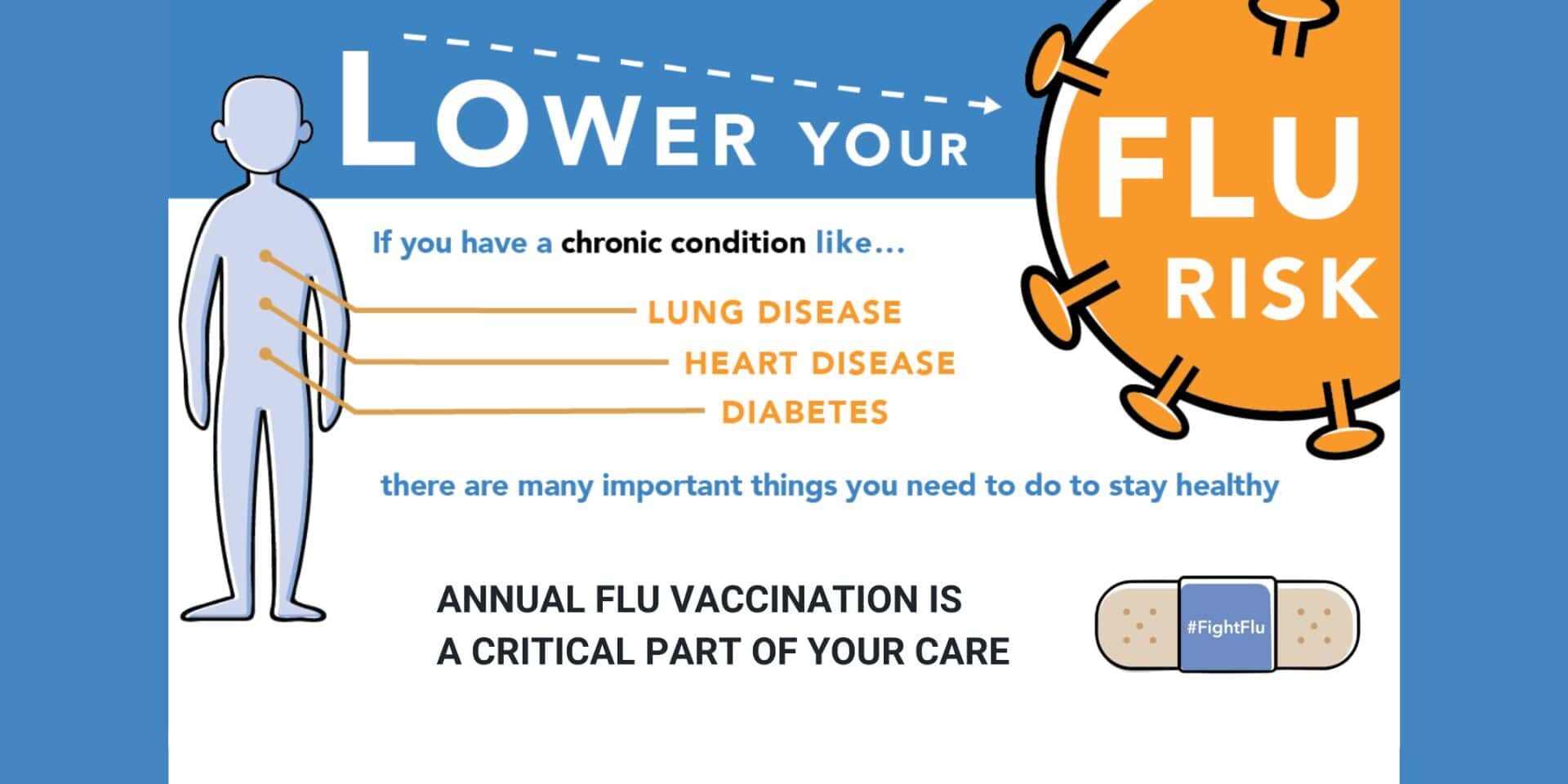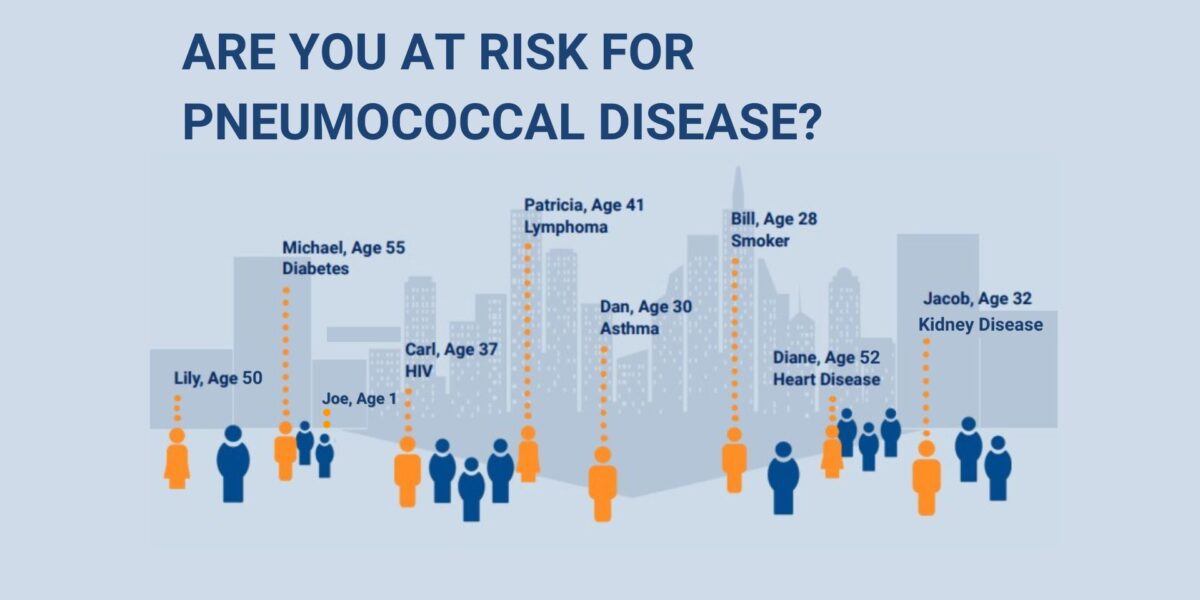
During National Influenza Vaccination Week, experts encourage everyone age 6 months and older to get vaccinated to reduce risk of severe illness and hospitalization
Arlington, VA, Bethesda, MD, Chicago, IL, and Dallas, TX (December 3, 2024)—According to the Centers for Disease Control and Prevention (CDC), the 2023-2024 influenza (flu) season saw between 34-75 million flu cases, up to 900,000 hospitalizations, and as many as 100,000 deaths. December 2-6, 2024 is National Influenza Vaccination Week, and the American Heart Association, American Lung Association, American Diabetes Association®, and National Foundation for Infectious Diseases are partnering to urge everyone age 6 months and older to get an annual flu vaccine.
In the US, flu season typically peaks between December and March. Although the best time to get vaccinated in the US is typically in the fall, before flu viruses start circulating widely, flu vaccination is still beneficial anytime during the season. It is important to get vaccinated before the holidays when people typically spend more time traveling and indoors with their families. Experts urge those who have not yet gotten a flu vaccine to do so as soon as possible.
The 2023-2024 flu season data revealed that 94.3% of adults and 71% of children and adolescents hospitalized with flu had at least 1 underlying medical condition. This underscores the need for those who are at a higher risk for severe complications to get vaccinated against flu each year, including:
- Adults age 65 years and older
- Pregnant women
- Individuals with chronic health conditions, including asthma, COPD, heart disease, diabetes, and kidney disease
“The threat of influenza and COVID-19 is particularly significant for individuals with diabetes and/or obesity, especially since many people living with diabetes also experience additional complications such as heart disease and kidney disease. It is recommended that all eligible individuals, particularly those with diabetes, obesity, and other chronic illnesses, stay current with their annual vaccines, including flu vaccine,” said Raveendhara Bannuru, MD, PhD, American Diabetes Association (ADA) vice president of medical affairs. “Get vaccinated to protect loved ones who are at higher risk for complications, even if you do not have diabetes or obesity.”
“Getting your flu vaccine is one of the most effective and proven ways to protect yourself and those around you from severe illness, hospitalizations, and even death caused by influenza. Flu vaccines have been shown to reduce flu-related doctor visits and hospitalizations by 40–60% across all age groups. For older adults, children, and those with chronic health conditions, flu vaccination is especially critical, as these groups face higher risks of complications. With flu vaccination rates lagging pre-pandemic levels, it’s more important than ever to prioritize this simple yet impactful preventive measure,” said Eduardo Sanchez, MD, MPH, the American Heart Association’s chief medical officer for prevention.
“Last flu season, 35% of adults hospitalized due to flu had a chronic lung disease. Since flu itself is a respiratory virus, it is imperative that people with a lung disease get vaccinated,” said Albert Rizzo, MD, chief medical officer for the American Lung Association. “Annual flu vaccination is essential to help protect against severe flu-related illness and reduce the burden on our healthcare system. By getting vaccinated, you are not only protecting yourself but also helping to prevent the spread of flu in your community.”
According to a recent National Foundation for Infectious Diseases (NFID) survey, only 38% of US adults say they will definitely get a flu vaccine during the 2024-2025 season, despite 2 out of 3 (67%) agreeing that annual flu vaccination is the most effective way to prevent flu-related hospitalizations and deaths. Among US adults age 18-64 years with at least 1 chronic health condition, only 46% received a flu vaccine last season, 3 percentage points lower than in 2022-2023 (49%), and 4 percentage points lower than in 2021-2022 (50%). “This downward trend is troubling because people who have chronic health conditions are more likely to develop serious and even life-threatening complications from flu,” said NFID Medical Director Robert H. Hopkins, Jr., MD. “Flu vaccines save lives, and getting vaccinated each year is the best line of defense to help protect yourself, your family, and your community from serious disease and potential complications.” CDC estimates that during the 2023-2024 respiratory season, flu vaccination prevented 9.8 million flu-related illnesses, 120,000 flu-related hospitalizations, and 7,900 flu-related deaths.
The American Heart Association, American Lung Association, American Diabetes Association, and National Foundation for Infectious Diseases all offer educational resources on their websites about the burden of flu and the importance of vaccination for people with chronic health conditions.
About the National Foundation for Infectious Diseases
Founded in 1973, the National Foundation for Infectious Diseases (NFID) is a non-profit 501(c)(3) organization dedicated to educating and engaging the public, communities, and healthcare professionals about infectious diseases across the lifespan. NFID promotes a Take 3 approach to help prevent respiratory illnesses: 1) Get vaccinated; 2) Practice healthy habits to help stop the spread of infectious diseases (wash hands often, stay home when sick, cover coughs and sneezes, and consider wearing a mask if you or a household member are at increased risk of severe illness); 3) Treat with prescription medication if recommended by a healthcare professional. NFID has a 4-star rating from Charity Navigator and has earned a Platinum transparency seal from Candid. For more information, visit www.nfid.org and https://es.nfid.org/ (in Spanish).
About the American Heart Association
The American Heart Association is a relentless force for a world of longer, healthier lives. We are dedicated to ensuring equitable health in all communities. Through collaboration with numerous organizations, and powered by millions of volunteers, we fund innovative research, advocate for the public’s health and share lifesaving resources. The Dallas-based organization has been a leading source of health information for nearly a century. Connect with us on heart.org, Facebook, X or by calling 1-800-AHA-USA1.
About the American Lung Association
The American Lung Association is the leading organization working to save lives by improving lung health and preventing lung disease through education, advocacy and research. The work of the American Lung Association is focused on four strategic imperatives: to defeat lung cancer; to champion clean air for all; to improve the quality of life for those with lung disease and their families; and to create a tobacco-free future. For more information about the American Lung Association, which has a 4-star rating from Charity Navigator and is a Platinum-Level GuideStar Member, or to support the work it does, call 1-800-LUNGUSA (1-800-586-4872) or visit: Lung.org.
About the American Diabetes Association
The American Diabetes Association (ADA) is the nation’s leading voluntary health organization fighting to bend the curve on the diabetes epidemic and help people living with diabetes thrive. For 83 years, the ADA has driven discovery and research to treat, manage, and prevent diabetes while working relentlessly for a cure. Through advocacy, program development, and education we aim to improve the quality of life for the over 133 million Americans living with diabetes or prediabetes. Diabetes has brought us together. What we do next will make us Connected for Life®. To learn more or to get involved, visit us at diabetes.org or call 1-800-DIABETES (1-800-342-2383). Join the fight with us on Facebook (American Diabetes Association), Spanish Facebook (Asociación Americana de la Diabetes), LinkedIn (American Diabetes Association), Twitter (@AmDiabetesAssn), and Instagram (@AmDiabetesAssn).
Contact: Diana Olson (NFID), dolson@nfid.org
Recent Press Releases

Adults Age 50 and Older Can Help Lower Risk for Pneumonia
NFID and the American Lung Association are working together to raise awareness about the importance of pneumococcal disease vaccination for those at risk

Data-Driven Approach to Increasing US Vaccine Uptake
The goal of the pilot project is to assist those on the frontlines in deploying effective approaches to public health outreach and service delivery.

NFID Surveys Find Gaps in Communication about Flu Between Healthcare Professionals and Patients with Chronic Health Conditions
Disconnect between patients and HCPs on flu vaccine recommendations may put patients at risk Less than one third (31 percent) of HCPs say they recommend…
